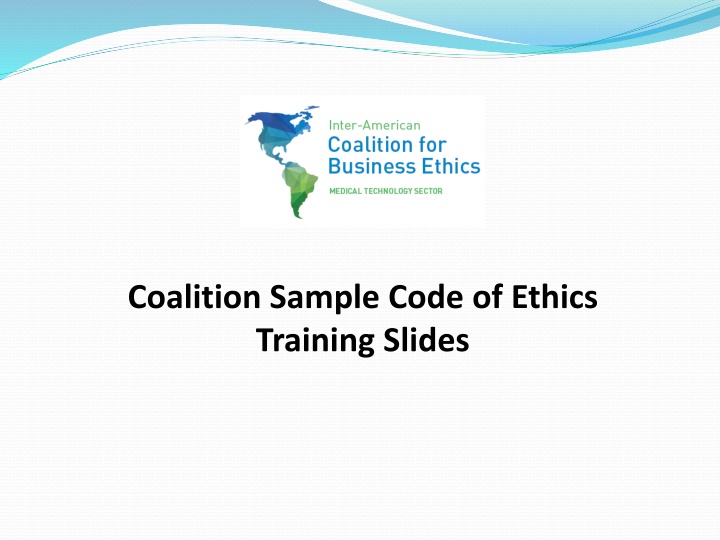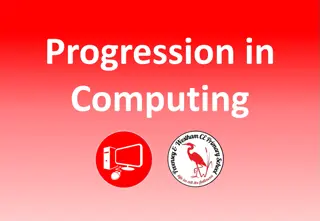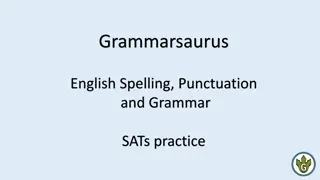Helpful Guidance for KS2 SATs in Spring 2017
Prepare your child for Key Stage 2 SATs with this informative guidance covering recent changes, scaled scores, test format, and important dates. Understand the expectations of the new curriculum and how results are reported to support your child's learning journey.
Uploaded on Apr 09, 2025 | 2 Views
Download Presentation

Please find below an Image/Link to download the presentation.
The content on the website is provided AS IS for your information and personal use only. It may not be sold, licensed, or shared on other websites without obtaining consent from the author.If you encounter any issues during the download, it is possible that the publisher has removed the file from their server.
You are allowed to download the files provided on this website for personal or commercial use, subject to the condition that they are used lawfully. All files are the property of their respective owners.
The content on the website is provided AS IS for your information and personal use only. It may not be sold, licensed, or shared on other websites without obtaining consent from the author.
E N D
Presentation Transcript
Coalition Sample Code of Ethics Training Slides
The Medical Device Industry Difference: Close and ongoing collaboration between health care professionals and medical technology companies is necessary for patient safety and medical innovation. Medical technologies require hands-on training and practice to assure safe and effective use and retraining as medical technologies undergo repeated changes (short life cycle). Physicians bring practical field and other experience vital to continued development and improvement of medical technology. 2
Rationale for Having a Code of Ethics Because it s the right thing to do! Provide basic ground rules for daily operations Establish visible guidelines for behavior Instill patient confidence in medical decision making Build industry credibility with government and opinion leaders Serve social responsibility and accountability goals
Coalition Sample Code of Ethics Based on the Bogot Principles Sections of the Code Purpose of Code & General Provisions I. Consulting Arrangements II. Third Party Education Programs III. Company-Organized Education and Training IV. Sales and Promotional Meetings V. Educational Items VI. No Gifts or Entertainment VII. VIII. Demonstration and Evaluation Products Charitable Donations and Research and Education Grants IX. Ensuring Effective Code Implementation X. 4
Purpose of Code & General Provisions To facilitate voluntary ethical interactions between Association members and Health Care Professionals (HCPs). Encourage public confidence in the Medical Device and Diagnostics Industry. Ensure that interactions are conducted according to the following principles: Integrity, Independence, Appropriateness, Transparency, and Advancement
Principles of the Code Integrity means dealing honestly, truthfully, and fairly with all parties. Independencemeans that Healthcare Professionals interactions with Companies should not skew the Healthcare Professional s medical decision making from the best interests of the patients. Appropriateness means that arrangements conform to proper commercial standards, and are accurate and free from corrupt purposes. Transparency means that Companies and Healthcare Professionals are open regarding significant financial relationships between the parties. Advancement means that relationships are intended to advance medical technology, innovation and patient care.
Scope of Code includes any individuals or entities that develop, produce, manufacture, sell, market or distribute Medical Technologies and Health Care Professionals (HCPs)
Defining Medical Technologies includes medical products, technologies and related services and therapies used to diagnose, treat, monitor, manage and alleviate health conditions and disabilities.
Defining Healthcare Professionals those individuals and entities that purchase, lease, recommend, use, arrange for the purchase or lease of, or prescribe Companies Medical Technologies.
Consulting Arrangements Companies may engage Healthcare Professionals to provide services that support R&D to advance medical science, develop new technologies, improve existing products and services, or enhance patient care Companies may not engage Healthcare Professionals as a means of inappropriate inducement. Payments for services should be at fair market value, and companies should engage only the number of Healthcare Professionals reasonably needed to perform the services Consulting arrangements should be disclosed in advance and in writing to the Healthcare Provider s institution or employer or other authority as provide by local laws Companies may reimburse appropriate and reasonable expenses, including travel and accommodations 10
Third-Party Education Programs Grants to Conference Organizers Provisions to provide funds for bona fide educational expenses that do not inappropriately benefit individual HCPs Conference Meals and Refreshments Reasonable expenses may be compensated for the HCPs only, not spouses or guests. Advertisements and Demonstrations; Satellite Symposia Companies may purchase advertisements and lease booth space for Company displays at conferences 11
Company-Organized Education & Training Companies may provide training of HCPs. Training and Education programs should be conducted in venues that are conducive to the transmission of learning and are selected based on their suitability for the program. Companies may pay the reasonable travel, meals and lodging costs of the attending HCP but may not provide recreation, entertainment. Companies may not pay expenses for a guest or spouse. 12
Company-Organized Education & Training Do s Appropriate location Signed simple agreement with the healthcare professional (for large event) Agenda / program (for smaller events) Don t s Resort locations Hospitality shouldn t be the main focus Not for partners or guests of the healthcare professional Gifts and inducements
Sales & Promotional Meetings It may be appropriate for Company representatives to meet from time to time with HCPs. E.g., to discuss medical technology features, sales terms, or contracts. Such meetings should generally occur at or near the HCP s place of business, although occasionally such discussions may take place at another mutually convenient location. It is appropriate to pay for reasonable meals and travel costs of attendees but Companies may not pay for or invite spouses or guests of HCPs to participate in business meetings. 14
Educational Items A Company occasionally may provide items to HCPs that benefit patients or serve a genuine educational function for HCPs With the exception of textbooks and anatomical models, any such item should have a fair market value of less than [appropriate value] Companies should not provide items that are capable of use by HCPs (or their family members, office staff or friends) for non-educational or non-patient related items 15
No Gifts or Entertainment It is inappropriate to provide gifts or entertainment in the context of any type of interactions with HCPs Companies may not provide gifts Prohibited items include, for example: cash/gift cards, food, wine/spirits, gift baskets, or flowers Companies may not provide any type of non-educational branded promotional items Companies may not provide or pay for any entertainment or recreational event or activity for any HCP. Prohibited activities include, for example: sporting events, cultural or artistic activities, or leisure activities 16
Demonstration & Evaluation Products Companies can improve patient care by providing Medical Technologies to HCPs free of charge for demonstration and evaluation purposes, provided that such products are not given or intended as an inappropriate inducement. Evaluation products should be appropriately disclosed and documented and Companies should ensure the loaned products are retrieved or returned if not purchased. 17
Charitable Donations and Research & Education Grants Companies may provide support to organizations engaged in disaster relief, indigent care, public education, patient education, and other charitable missions and support scientific and medical research. A Company may not provide such grants or donations as an unlawful inducement and donations should be motivated by bona fide charitable purposes and should be made only to bona fide charitable organizations. 18
Charitable Donations and Research & Education Grants (cont.) Charitable Donations Companies may make monetary and in-kind donations to support bona fide charitable organizations and missions, provided that the donation is not intended as an inappropriate inducement and does not privately benefit a HCP. Educational Grants Companies may provide grants for legitimate educational purposes including grants to support medical education and grants to support the education of patients and the public about important healthcare topics. Companies may also make educational grants to sponsors of third-party educational conferences 19
Charitable Donations and Research & Education Grants (cont.) Research Grants Companies may provide research grants to support independent medical research with scientific merit for the purpose of advancing scientific and clinical information, improving clinical care, promoting improved delivery of healthcare, or to otherwise benefit patients. Sponsored research should have well-defined objectives and milestones and may not be linked directly or indirectly to the purchase of Medical Technologies. 20
Ensuring Effective Code Implementation In order to ensure effective implementation of Code principles, each Association Member Company should take the following concrete steps: appoint a senior executive responsible for oversight of the Company's compliance with this Code; adopt practical, useful, and meaningful policies, guidance and tools intended to ensure compliance with the Code; provide effective and ongoing training and education on the Code and on company policies implemented to ensure Code compliance; ensure that senior management and the company s board of directors or other governing body have expressly committed to support the Code; 21
Ensuring Effective Code Implementation (cont.) institute appropriate internal monitoring and auditing mechanisms; create safe mechanisms for, and encourage, employees who raise concerns; require that third party intermediaries (including consultants, distributors, sales agents, and brokers) that may interact with Healthcare Providers in connection with Company Medical Technologies agree to comply with this Code; and provide a certification to Association that the Company has signed onto the Code of Ethical Conduct, so those Member Companies can be publicized. 22
Non-Member Companies Companies that are not members of an Association but which are engaged in the Industry are encouraged to adhere to and observe the Code.
The Code of Practice is NOT intended: To provide legal advice To take precedence over any relevant law or regulation Nor can it give specific directives for every interaction between members and healthcare professionals Association member companies agree to adhere to ethical business practices and practice socially responsible conduct























